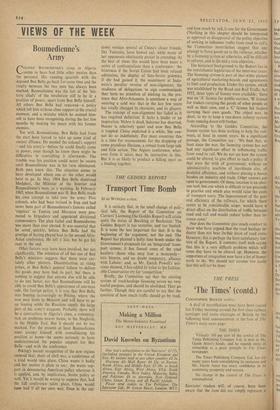THE GEDDES REPORT
Transport Time Bomb
ALAN WATKINS writes: It is unlikely that, in the small change of poli- tical talk, the Report of the Committee on Carriers' Licensing (the Geddes Report) will attain quite the status of Beeching or Buchanan. The Geddes Report is too tentative, and too limited. It is none the less important for that. It is the beginning of the argument, not the end. The Report has planted a hefty time bomb under the Government's proposals for an 'integrated' trans- port system; it has forced some of the road hauliers—those who may lose a monopoly— into bizarre, and no doubt temporary, alliance with Labour; and, as Mr. Enoch Powell's wel- come showed, it has added its voice to the fashion- able Conservative cry for 'competition.'
Briefly, the Committee say that the existing system of road-haulage licensing serves no very useful purpose, and should be abolished. They go further. Though they are careful to say that the question of how much traffic should go by road, and how much by rail, is one for the Government ('Nothing in this chapter should be interpreted as approval or disapproval of the policy objective of seeking to influence traffic from road to rail). the Committee nevertheless suggest that an attempt to force goods on to the railways, whethei by a licensing system or otherwise, will be difficult to enforce, and in the end a vain objective.
The historical background to the Report lies in the restrictionist legislation of the inter-war years. The licensing system is part of that wider picture of agricultural marketing boards and agreement, to limit coal production. Under this system, which was established by the Road and Rail Traffic Act 1933, three types of licence were available: there was an 'A' licence for public carriers, 'B' licence for traders carrying the goods of other people as well as their own, and a 'C' licence for traders carrying their own goods. The object was, in short, to try to keep a run-down railway system from running down still further.
According to the Geddes Committee, the licence system has done nothing to help the rail- ways, at least in recent years. In a significant passage, the Committee say : 'We find that, at least since the war, the licensing system• has not had any significant effect in influencing traffic from road to rail. We do not see how the system could be altered, to give effect to such a policy if that were the wish of government, without an administrative machine of inordinate size, of doubtful efficiency, and without placing a heavy burden on industry and trade. Other courses arc open to government. Of these, taxation is an obvi- ous tool, but one which is difficult to use precisely in practice and which also would raise the costs of transport users. The improvement of the gen- eral efficiency of the railways, for which there seems to be considerable scope, would have a direct effect on the distribution of traffic between road and rail and would reduce 'rather than in- crease costs.'
Nor does the Committee give much comfort to those who have argued that the road haulage in- dustry does not bear its' fair share of road costs. However, this is perhaps the least satisfactory fea- ture of the Report. It contents itself with saying that this is a very difficult problem which will some day have to be cleared up. However, the supporters of integration now have a lot of home- work to do. We should not assume too easily that this will not be done.






































 Previous page
Previous page